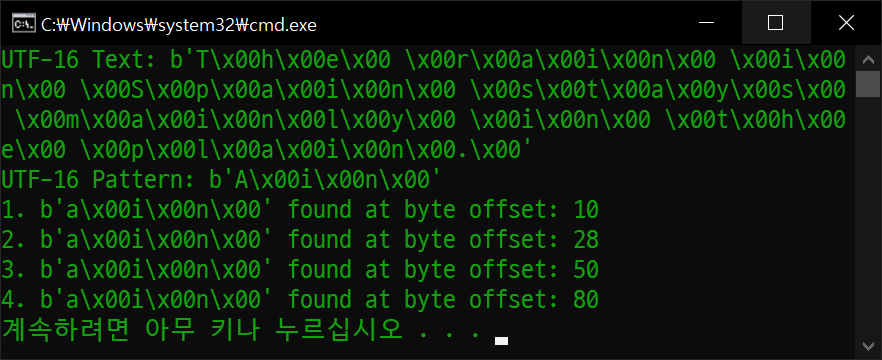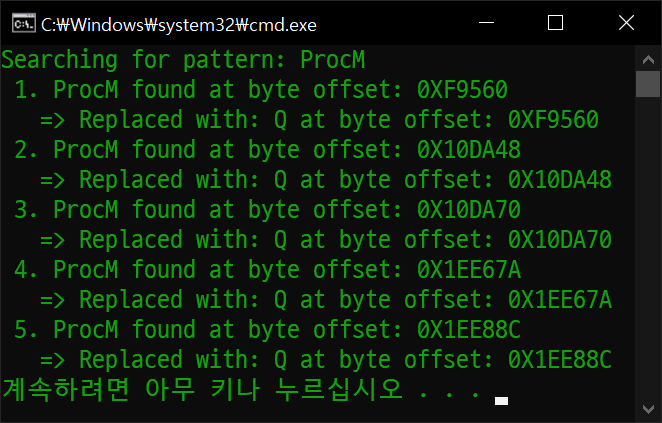Binary File Unicode String Edit 바이너리 파일 유니코드 문자열 편집
Python 2025. 11. 9. 22:52 |바이너리 파일을 읽고 유니코드 문자열을 찾아 수정해 보자.
이 파일의 내용을 읽고 수정해 보자.

import binascii
with open("Procmon64.exe", "rb") as f:
f.seek(0xf9560) # 파일 포인터 이동
data = f.read(10)
print(f"Bytes: {data}")
print(f"Hex: {binascii.b2a_hex(data).decode().upper()}")
print(f"Unicode: {binascii.unhexlify(binascii.b2a_hex(data)).decode(encoding='utf-16', errors='ignore')}")
print("File Pointer Position: " + hex(f.tell()).upper()) # 현재 파일 포인터 위치 출력
0xF9560위치에서 10바이트를 읽고 출력해 보자.

import binascii
with open("Procmon64.exe", "r+b") as f:
f.seek(0xf9560) # 파일 포인터 이동
pattern = "QrocM".encode(encoding="utf-16le").hex()
f.write(bytes.fromhex(pattern))
f.seek(-10, 1) # 현재 위치(1)에서 10바이트 앞으로 이동
data = f.read(10)
print(f"Bytes: {data}")
print(f"Hex: {binascii.b2a_hex(data).decode().upper()}")
print(f"Unicode: {binascii.unhexlify(binascii.b2a_hex(data)).decode(encoding='utf-16', errors='ignore')}")
'ProcM'을 'QrocM'으로 바꿔보자.


import binascii
file_name = "Procmon64.exe"
pattern = "ProcM"
byte_sequence = pattern.encode(encoding="utf-16le")
def find_all_bytes(file_name, byte_sequence):
with open(file_name, 'rb') as f:
file_content = f.read() # 파일 전체를 바이트열로 읽어옵니다.
occurrences = []
start_index = 0
while True:
try:
# find() 메서드는 일치하는 위치의 인덱스를 반환합니다.
index = file_content.find(byte_sequence, start_index)
if index == -1:
break # 더 이상 일치하는 패턴이 없으면 루프를 종료합니다.
occurrences.append(hex(index).upper())
start_index = index + len(byte_sequence) # 다음 검색 시작 위치를 갱신합니다.
except ValueError:
break
return occurrences
positions = find_all_bytes(file_name, byte_sequence)
print(f"문자열 {pattern}({byte_sequence.hex().upper()})이(가) 발견된 위치:")
for idx, pos in enumerate(positions):
print(f"{idx+1}. 오프셋 [{pos}]에서 발견됨.")
파일 전체에서 'ProcM' 문자열을 찾아보자.


import re
text = "The rain in Spain stays mainly in the plain.".encode(encoding="utf-16le")
print(f"UTF-16 Text: {text}")
matches = re.findall("ain".encode(encoding="utf-16le"), text) # 대소문자 구분
print(matches)
matches = re.findall("Ain".encode(encoding="utf-16le"), text, re.IGNORECASE) # 대소문자 무시
print(matches)
'PROCM', 'procm', 'Procm' 등 대소문자 구분없이 모든 문자열을 찾기 위해 파이썬 정규식 표현을 살펴보자.

import re
text = "The rain in Spain stays mainly in the plain.".encode(encoding="utf-16le")
pattern = "Ain".encode(encoding="utf-16le")
print(f"UTF-16 Text: {text}")
print(f"UTF-16 Pattern: {pattern}")
for idx, match in enumerate(re.finditer(pattern, text, re.IGNORECASE)):
print(f"{idx+1}. {match.group()} found at byte offset: {match.start()}")
이번엔 finditer()로 문자열의 위치까지 정확히 찾아보자.

import binascii
import re
file_name = "Procmon64.exe"
pattern = "ProcM"
byte_sequence = pattern.encode(encoding="utf-16le")
with open(file_name, 'rb') as f:
file_content = f.read()
print(f"Searching for pattern: {pattern}")
# Find all occurrences of the byte sequence in the file content
for idx, match in enumerate(re.finditer(byte_sequence, file_content, re.IGNORECASE)):
print(f"{idx+1:2}. {binascii.unhexlify(binascii.b2a_hex(match.group())).decode(encoding='utf-16', errors='ignore')} \
found at byte offset: {hex(match.start()).upper()}")
위 결과를 바탕으로 'ProcM' 문자열을 대소문자 구분 없이 찾아보자.


import binascii
import re
def replace_pattern_in_file(file_name, pattern, replacement):
byte_sequence = pattern.encode(encoding="utf-16le")
with open(file_name, 'r+b') as f:
file_content = f.read()
print(f"Searching for pattern: {pattern}")
# Find all occurrences of the byte sequence in the file content
# Case-sensitive search
for idx, match in enumerate(re.finditer(byte_sequence, file_content)):
print(f"{idx+1:2}. {binascii.unhexlify(binascii.b2a_hex(match.group())).decode(encoding='utf-16', errors='ignore')} found at byte offset: {hex(match.start()).upper()}")
f.seek(match.start())
f.write(replacement.encode(encoding="utf-16le"))
print(f" => Replaced with: {replacement} at byte offset: {hex(match.start()).upper()}")
file_name = "Procmon64.exe"
pattern = "ProcM"
replace_pattern_in_file(file_name, pattern, "Q")
파일에서 대소문자를 구분해 문자열을 모두 찾아 바꾸는 함수를 작성했다.
함수에 파일 이름, 찾을 문자열, 바꿀 문자열을 인자로 주고 실행한다.

'Python' 카테고리의 다른 글
| English Vocabulary 영어 단어 학습기 (0) | 2025.11.17 |
|---|---|
| Christmas Tree with Python 파이썬 크리스마스 트리 (0) | 2025.11.11 |
| Windows Mutex for Python (0) | 2025.02.26 |
| [Pygame] Sorting Algorithms in Python 파이썬 정렬 알고리즘 2 (0) | 2024.03.22 |
| [Pygame] Sorting Algorithms in Python 파이썬 정렬 알고리즘 1 (1) | 2024.03.09 |
